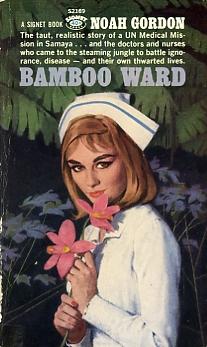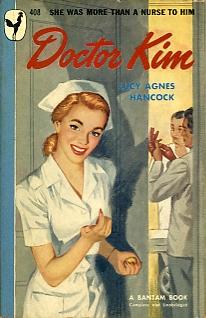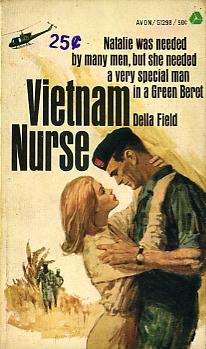Bamboo Ward
In a savage jungle, among primitive people
By William Wetherall
First posted 11 October 2006
Last updated 15 October 2006
Noah Gordon The blurbs on the front and back covers and the fly are typical of the romance thriller genre. Front cover
Back cover
Front fly
Nurse and doctor storiesDuring the late 1950s and early 1960s, nurses and doctors became heroes of their own subgenre of romance fiction. Many authors who wrote medical romance thrillers set at least one of their stories in the Steamy East. Bamboo Ward included a list of four "Other SIGNET Nurse and Doctor Stories" in print at the time. Night Ward (Noah Gordon, S2114) Emergency Nurse (Jane Converse, S2079) Aloha Nurse (Ethel Hamill, S2022) Sky Doctor (Shane Douglas, S2139) National geographiesThe members of the American contingent of the UN medical team in Samaya are Dr. Michael Cooper, a heart surgeon, and Beth Sommers and Cecile Leighton, both R.N. surgical nurses. All three are working at Scollay Memorial Hospital in Boston when they are chosen for the mission by chief surgeon Dr. Alexander Weintraub. Samaya is introduced as an undeveloped country is Asia (page 13). All Beth knows, from old copies of National Geographic, is that it has "Jungles and rice paddies and girls without T shirts driving oxen" (page 17). The Americans cross the United States and the Pacific in civilian plans. At Laos they join a U.S. Army field hospital travel with it to Karachi in Air Force Flying Boxcars. At Karachi the party board a helicopter, in which Beth is said to be "gazing out the porthole and watching the small countries of Southeast Asia passing below" (page 28). The geography seems to be as fictional as the names of the Boston hospital and the country. Samaya is described as the site of a former French penal colony, and the French doctor, a former inmate, still treats some local lepers. From this I get the impression that the country is a composite of places like French Guiana in South America and New Caledonia in the Coral Sea, both of which were flung far enough from Paris to qualify as sites of large penal colonies. Noah GordonNoah Gordon (b1926) received degrees in journalism and English literature, then worked as a writer and editor of mostly scientific and medical articles. He began another career, as an editor of psychiatric and medical journals, while writing his first major novel, The Rabbi (1965), in the early 1960s. Most of his fiction has been about Judaism and/or medicine, as suggested by the titles of his other bestsellers. Early "nursing" novelsGordon's first novels, though, were two thin paperback nurse adventures called Night Ward (Signet, 1952, 128 pages) and Bamboo Ward (Signet, 1962, 126 pages). 1952 Night Ward 1962 Bamboo Ward 1965 The Rabbi 1969 The Death Committee 1979 The Jerusalem Diamond 1986 The Physician [Cole trilogy 1, 11th century] 1992 Shaman [Cole trilogy 2, 19th century] 1996 Matters of Choice [aka Choices, Cole trilogy 3, present] 2000 The Last Jew All Gordon says on his website about his first two works is: "I published two paperback novels about nursing, one of which became a back-of-the-book novel in Redbook Magazine" (www.noahgordonbooks.com). My guess is that the Redbook story was Night Ward, which had 9 printings by 1959 and a 10th printing (Signet D3133) sometime later, and at least two Canadian printings. On the brink of invading JapanThe trip to Samaya is not Dr. Cooper's first trip across the Pacific, for he had been on a Navy torpedo boat during World War II (page 27). Noah Gordon, on his website, states that he wanted to serve in the Navy but wore glasses and was color-blind, and ended up in the U.S. Infantry (www.noahgordonbooks.com).
In some sense, Bamboo Ward is the trip across the Pacific that Noah Gordeon, the soldier who wanted to be a sailor, never made. |




